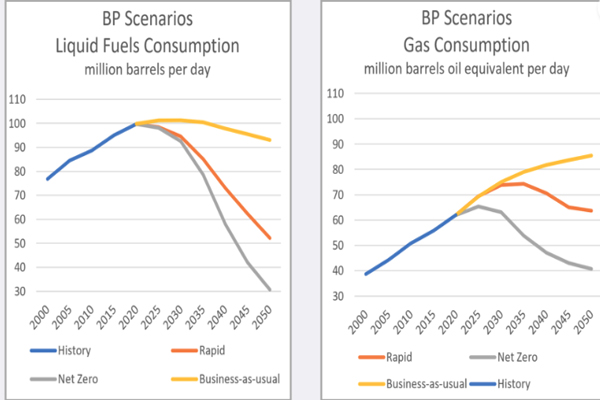BP’s latest scenarios for oil and gas demand to 2050 show that, whether the energy transition is speedy or slow, consumption will be higher at the mid-century stage than it previously thought.

Jon Mainwaring, Argus Media
LONDON
EnmergiesNet.com 07 10 2024
This year’s BP Energy Outlook, published today, focuses on two scenarios, both at the extreme of transition outcomes. The Current Trajectory scenario — which is not consistent with a 2°C carbon budget — places weight on climate policies already in force. The ‘Paris-consistent’ Net Zero scenario assumes there is a significant tightening in those policies.
BP’s projection for global oil demand to 2050 under the Current Trajectory scenario, at 76.8mn b/d, is slightly greater than the estimate it made under a similar scenario in last year’s outlook for 75mn b/d. Under the the same Net Zero scenario it employed last year, BP has significantly raised its oil demand estimate for 2050 to 28.2mn b/d, from 20mn b/d.
In the medium term, BP sees oil demand at 101.7mn b/d under both scenarios in 2025. Under the Current Trajectory scenario this will plateau in the latter part of this decade before falling to 97.8mn b/d by 2035. Under the Net Zero scenario, oil demand will fall more sharply to 94.7mn b/d by 2030 and then to 80.2mn b/d by 2035.
Long road ahead
BP said the single biggest driver reducing oil consumption will be declining use of oil in road transportation, as vehicle efficiency improves and alternative fuels are used more, led by the electrification of cars and trucks.
But some offsetting of this decline will occur “as rising prosperity boosts consumption of plastics, textiles and other oil-based materials,” BP said.
Under the Current Trajectory scenario, oil use in road transport declines by 3.4mn b/d over the 2022-35 period and then by 15.5mn b/d between 2035-50. Under Net Zero, road transport consumption declines by 9.6mn b/d over 2022-35 and by 26mn b/d over 2035-50. Oil consumption for use in petrochemicals feedstocks increases in both scenarios through to 2035, adding 5.4mn b/d of demand in the Current Trajectory scenario and 3.5mn b/d of demand under Net Zero.
But there is a divergence after 2035 when the Current Trajectory scenario sees 1.5mn b/d going to feedstocks but the Net Zero scenario sees this falling by 5.6mn b/d. In the former scenario use of oil as a feedstock plateaus at around 25mn b/d in the 2040s, while in the latter scenario use of oil as a feedstock peaks in the 2030s.
Gas up
BP’s Current Trajectory scenario has natural gas demand increasing from 3.96 trillion m³/yr in 2022 to 4.73 trillion m³/yr in 2050, slightly greater than the 4.62 trillion m³/yr estimate it had last year in its similar New Momentum scenario.
But as with its oil demand projections, the company’s Net Zero scenario sees 1.80 trillion m³/yr of gas demand by mid-century against 1.66 trillion m³/yr previously. Even by 2035 the difference between the two scenarios when it comes to gas demand is stark, a gap of almost 850bn m³/yr or one-fifth of the potential demand by then.
The wide gap between scenario outcomes for gas — with gas demand growing by 19pc under the Current Trajectory projections and plummeting by 58pc under Net Zero by mid-century — reflects two significant opposing trends, BP said. The first is increasing demand in emerging economies as they grow and industrialise. The second is a shift away from natural gas to greater electrification and lower-carbon fuels. But the net effect of these depends on the speed of the energy transition.
Also underpinning BP’s projections are trends common to both scenarios. One is that energy demand grows more strongly in emerging economies, driven by rising prosperity and living standards. Another is that the structure of this demand will change as fossil fuels are replaced by a growing share of low-carbon energy.
But despite oil demand declining between 2022-50 in either scenario, oil will continue to play “a significant role in the global energy system for the next 10-15 years” resulting in the need to continue investing in the oil and gas upstream, BP said.
argusmedia.com 07 09 2024












